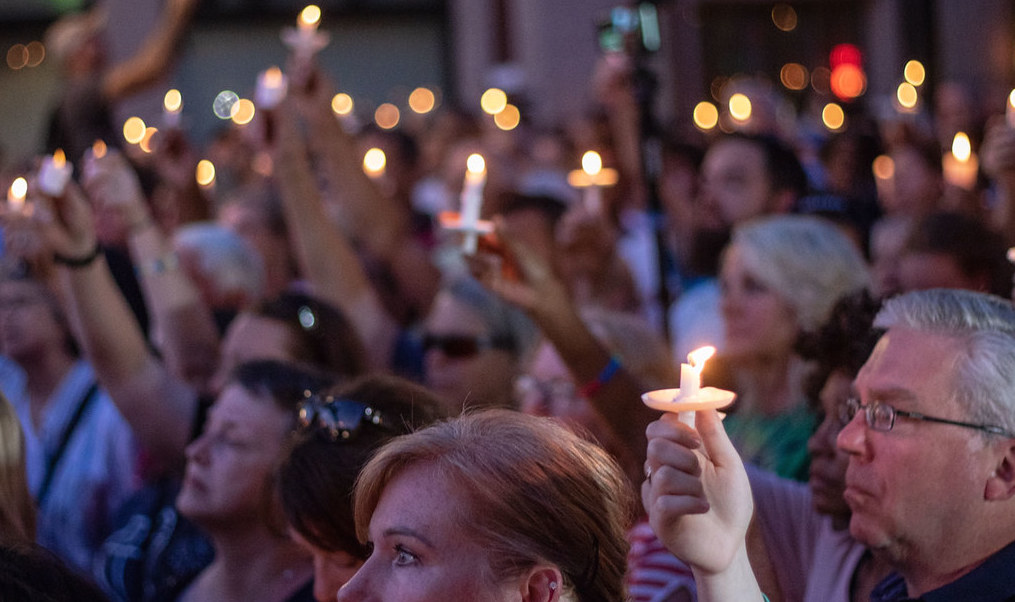The U.S. was rocked by two mass killings this past weekend. The first was in El Paso, Texas. The slaughter of 22 people in El Paso’s Cielo Vista Walmart was an act of a white supremacist. A manifesto he allegedly posted online shortly before the massacre echoed President Donald Trump’s anti-immigrant and anti-Latino rhetoric. “This attack is a response to the Hispanic invasion of Texas,” the alleged shooter wrote.
Late that night in Dayton, Ohio, throngs of people were enjoying the Oregon entertainment district when another white man in his 20s opened fire, killing nine people in about 30 seconds before police killed him. Among those he murdered was his sibling. Unlike the El Paso killer, the Dayton shooter left no “manifesto” to explain his motivation for the rampage, but had in the past expressed violent fantasies, an obsession with mass shootings, and classmates said he kept a rape and kill list while in high school. Misogyny is often linked to mass killers.
These horrific events have spurred political momentum for a change in the broken gun laws that have for far too long made the United States a virtual free-fire zone.
President Trump read a speech from a teleprompter Monday, rambling on about mental health and violent video games, largely toeing the NRA line. While he did suggest support for a national “red flag” law, allowing court-ordered confiscation of guns from a person deemed a threat to others or to him- or herself, Trump said, “Mental illness and hatred pulls the trigger, not the gun.” In fact, people who suffer from mental illness are far more likely to be the victims of gun violence than perpetrators of it. He also called for the death penalty for mass shooters.
While the Dayton shooter is dead, the El Paso shooter turned himself in to a police officer not far from the scene of the crime. His online declaration began, “I support the Christchurch shooter and his manifesto.” In fact, how New Zealand’s elected leader, and society at large, responded to that massacre last March of 51 Muslims should be the model for what happens in this country.
New Zealand’s Prime Minister Jacinda Ardern is the world’s youngest elected leader. After the Christchurch massacre, committed by a single gunman armed with an arsenal of legally purchased semi-automatic weapons, Ardern immediately pushed a ban on almost all semi-automatic and military-style weapons through Parliament. “Fifty people died and they do not have a voice. We in this house are their voice,” she said. In less than a month after the massacre, the assault weapons ban became law in New Zealand.
Trump did call Ardern to express condolences. Ardern said of the call: “He asked what offer of support the United States could provide. My message was sympathy and love for all Muslim communities.” When addressing her nation in response to the massacre, Ardern said:
“Many of those who will have been directly affected by this shooting may be migrants to New Zealand, they may even be refugees here. They have chosen to make New Zealand their home, and it is their home. They are us. The person who has perpetuated this violence against us is not. They have no place in New Zealand.”
Before departing from the White House to visit survivors in Dayton and El Paso Wednesday, Trump refused to take back his use of the word “invasion,” which he has repeatedly used to describe the arrival of immigrants and asylum seekers at the southern border. According to Media Matters for America, “Between January and February, President Donald Trump’s Facebook page ran about 2,200 ads referring to immigration as an ‘invasion.'” His use of the word “invasion” was invoked as justification by the killers in El Paso, Christchurch and in Pittsburgh last year. There, the shooter entered a synagogue and gunned down 11 Jewish worshippers who he believed supported “invaders.”
The response in New Zealand was to ban assault and semi-automatic weapons, and to embrace diverse immigrant communities. In the United States under Trump, the opposite is happening. Next month, laws will take effect in Texas loosening gun restrictions — for example, forbidding the banning of guns in schools and churches. Then, on Wednesday, the day Trump was ostensibly consoling wounded survivors in Dayton and El Paso, Immigration and Customs Enforcement conducted the largest single-state workplace enforcement action ever, arresting 680 people at several Mississippi food-processing plants, accusing them of being undocumented.
The scourge of guns and the war on immigrants continue.
Amy Goodman is the host of Democracy Now!, a daily international TV/radio news hour airing on more than 1,300 stations. She is the co-author, with Denis Moynihan, of The Silenced Majority, a New York Times bestseller. This column originally appeared on Democracy Now!
Photo: Becker1999/Flickr



